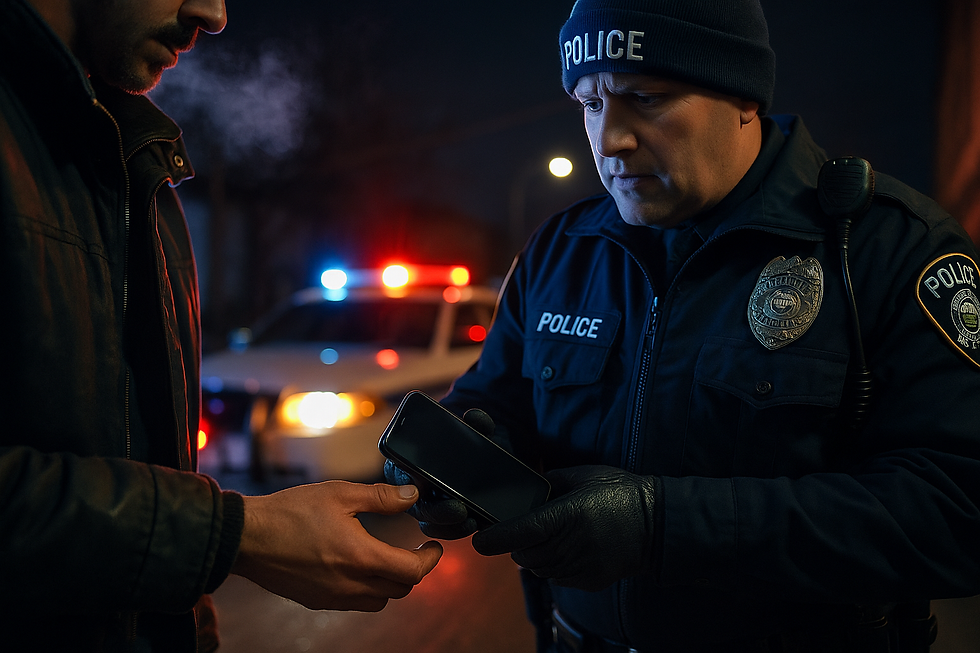Can Police Search My Phone Without a Warrant in North Dakota?
- Heartland

- Aug 12, 2025
- 3 min read

Your Phone Holds Your Life — And the Law Knows It
In today’s world, your cell phone is more than a device — it’s a digital vault holding your messages, photos, location history, banking apps, and personal notes. That’s why the question “Can police search my phone without a warrant in North Dakota?” is more important than ever.
The short answer: In most cases, police need a warrant before they can search your phone. But, as with many legal questions, there are exceptions you need to understand.
What the U.S. Supreme Court Says
In Riley v. California (2014), the U.S. Supreme Court ruled that police generally must obtain a warrant before searching a cell phone, even after an arrest. The Court recognized that phones contain vast amounts of personal data and deserve strong privacy protection under the Fourth Amendment.
Since this is a federal ruling, it applies in North Dakota too. But, like many
rules in criminal law, there are important exceptions.
When Police Might Search Your Phone Without a Warrant in North Dakota
Even though a warrant is usually required, there are situations where police can search your phone without one:
1. Consent
If you give police permission to search your phone, they don’t need a warrant.
Tip: You have the right to say no — and it’s often in your best interest to refuse politely.
2. Exigent Circumstances

If officers believe waiting for a warrant could result in:
Destruction of evidence
An immediate threat to safety
Prevention of a crime in progressThey may search without a warrant. These are rare and must be justified.
3. Plain View Doctrine
If illegal material is already visible on your phone screen while police are lawfully present, they may seize it. But accessing other areas of your phone still usually requires a warrant.
North Dakota-Specific Considerations
North Dakota follows federal constitutional law on phone searches, but state courts can interpret these rights narrowly or broadly. That means:
Local police departments in cities like Bismarck, Minot, Williston, and Dickinson may have specific search policies.
Tribal law enforcement in places like Standing Rock or Turtle Mountain may have their own procedures, but constitutional protections still apply.
What To Do if Police Ask to Search Your Phone in ND
Stay Calm and Polite — Never physically resist.
Ask if They Have a Warrant — If not, you can refuse.
Clearly State Your Refusal — Example: “I do not consent to a search of my phone.”
Contact a Criminal Defense Attorney — If your phone has been taken or searched, speak to a lawyer immediately.
Why This Matters in Criminal Defense Cases
Illegally obtained phone evidence can often be suppressed in court. That means it can’t be used against you if your rights were violated.An experienced North Dakota criminal defense attorney can:
Review how the phone was searched
File motions to exclude unlawfully obtained evidence
Protect your constitutional rights

Real-World Example
Imagine you’re stopped in Burleigh County for a traffic violation. An officer notices text notifications on your lock screen and asks to look through your messages. You say yes — and those messages are later used against you in a drug case. Had you refused, police likely would have needed a warrant, and the evidence might never have been collected.
Bottom Line
In North Dakota, police generally cannot search your phone without a warrant — unless you give permission or one of the narrow exceptions applies. Protecting your privacy starts with knowing your rights and exercising them calmly and confidently.
Contact Heartland Law Office
If your phone has been searched by police in Bismarck, Minot, Dickinson, Williston, or anywhere in North Dakota, we can help you fight to protect your rights and your future. Call 701-JUSTICE or contact us online for a confidential consultation.
Related Resources on Our Website
Check out our Criminal Defense page to learn how we protect your rights in North Dakota criminal cases.
Check out our DUI Defense page for strategies we use to fight DUI charges statewide.
Learn more about the local court process in our guides to the Burleigh County Courthouse and the Ward County Courthouse.
Helpful Legal References
This article is for informational purposes only and does not constitute legal advice. Always consult with a licensed attorney regarding your specific situation.





